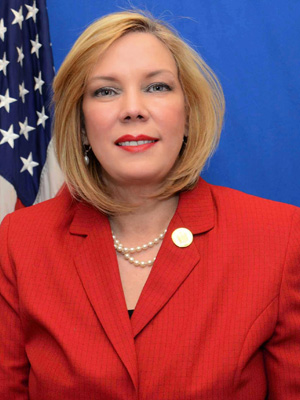2019-18
Comprehensive Economic Reforms for Military Families

Sen. Nilsa Cruz-Perez (NJ), NHCSL Veterans and Military Affairs Task Force Chair
Sponsored by Del. Elizabeth Guzmán (VA)
Unanimously ratified by the Caucus on December 5, 2019
WHEREAS, military families on average earn 27% less than their civilian counterparts, accounting for more than $10,000 of lost income each year;[1] and,
WHEREAS, military families relocate at a rate of about once every two or three years, while civilian families move at a rate of about once every eight or ten years;[2] and,
WHEREAS, more than half of active duty families planning to leave the service within two years, have less than $5,000 in savings for emergency;[3] and,
WHEREAS, military spouses face hardships reintegrating into the workforce, suffering from higher rates of unemployment or underemployment compared to their civilian counterparts;[4] and,
WHEREAS, the unemployment rate among military spouses is 26% which is about five times the unemployment rate of the United States;[5] and,
WHEREAS, although companies may be deterred from frequent relocation on military spouse resumes, the educational attainment of military spouses is actually higher than the civilian educational attainment level;[6] and,
WHEREAS, professional licenses often do not transfer across state lines, and about 35 percent of military spouses require professional licenses to maintain status (e.g. doctors, teachers, etc.);[7] and,
WHEREAS, there are nearly 1.2 million military children of active-duty service members across the United States with 80% of them attending public school;[8] and,
WHEREAS, military children experience difficulties maintaining lasting relationships because of their transient status as a student.[9]
THERFORE, BE IT RESOLVED, that the National Hispanic Caucus of State Legislators recognize the need to protect, invest, and bolster programs to benefit military families; and,
BE IT FURTHER RESOLVED, that the National Hispanic Caucus of State Legislators calls on the Federal Government to ensure military child development centers are fully funded and held to the highest standards of quality and safety; and,
BE IT FURTHER RESOLVED, that the National Hispanic Caucus of State Legislators calls on state legislators to pass comprehensive economic reforms for military families that—
- Increase educational support for military spouses,
- Implement priority placement programs for military spouses,
- Enhance programs that connect military spouses with employment,
- Provide for a tax credit for military spouses seeking professional re-licensure,
- Provide for temporary professional or occupational licensing for spouses of active duty military personnel based in the jurisdiction, if they are permanently licensed in the same profession or occupation in another state or territory; and,
BE IT FURTHER RESOLVED, that the National Hispanic Caucus of State Legislators calls on state legislators to pass comprehensive economic reforms for military families that—
- Provide increased benefits for military children in order to resolve issues that children face as they transition to new school districts and states,
- Educate service members and their families on the mental healthcare benefits available to them,
- Fund programs to educate mental health professional on the military lifestyle and the unique stress families face; and,
BE IT FINALLY RESOLVED, that, in the view of the situation and circumstances mentioned above, that the National Hispanic Caucus of State Legislators urges the President to recognize the need for economic reform for military families and urges Congress to create legislation which improves, benefits, or aids military families.
THE NHCSL EXECUTIVE COMMITTEE UNANIMOUSLY APPROVED THIS RESOLUTION ON AUGUST 3, 2019 AT ITS SUMMER MEETING IN SANTA FE, NM.
THE NATIONAL HISPANIC CAUCUS OF STATE LEGISLATORS UNANIMOUSLY RATIFIED THIS RESOLUTION ON DECEMBER 5, 2019, AT THE ANNUAL MEETING IN SAN JUAN, PR.
[1] https://www.theatlantic.com/family/archive/2019/03/majority-military-spouses-are-underemployed/585586/
[2] https://pdfs.semanticscholar.org/c567/b17bc58e83e93e68e28f1cfe270473593a48.pdf
[3] https://www.aarp.org/home-family/voices/veterans/info-2019/survey-family-stress.html
[4] https://www.theatlantic.com/family/archive/2019/03/majority-military-spouses-are-underemployed/585586/
[5] https://www.military.com/money/personal-finance/credit-debt-management/more-military-families-struggle-with-debt.html
[6]https://www.whitehouse.gov/wp-content/uploads/2018/05/Military-Spouses-in-the-Labor-Market.pdf
Approximately 30 percent of the U.S. working age population has a college degree, in comparison to and approximately 40 percent of military spouses in this age range do.
[7] See note 4
[8] https://www.aasa.org/content.aspx?id=8998
[9]https://www.army.mil/article/147786/experts_explain_mental_state_of_military_children
Separation anxiety, excessive worry, sleep problems, and stress are common in military brat culture. It is also important to note that these mental health issues are not phases and should be continuously monitored in military children.

